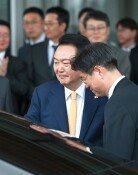Nuke Test Fails to Shake S. Korea`s Financial Market
Nuke Test Fails to Shake S. Korea`s Financial Market
Posted May. 26, 2009 05:24,
North Koreas nuclear test yesterday failed to have much effect on the South Korean benchmark stock market.
The KOSPI fell 88.54 points (6.31 percent) from Friday to 1,315.21 at one point after news of the test broke yesterday. After investors calmed down and more money was injected into the stock market in the afternoon, however, the index closed at 1,400.90, down 2.85 points (0.2 percent) from Friday.
The won-dollar rate soared to 1,269.40 in intra-day trading but closed at 1,249, up 1.6 points from Friday.
South Koreas financial market showed little change despite North Koreas saber rattling yesterday. Certain experts warned against reaching a positive conclusion too early, however, saying the impact of the nuclear test on South Koreas economy will depend on the international response and additional moves by Pyongyang.
Seoul immediately formed an emergency team consisting of staff from the Strategy and Finance Ministry, the Financial Services Commission and the Knowledge Economy Ministry to analyze the influence of the test on the South Korean economy and devise countermeasures.
○ `Learning effect buoys S. Korean market
The learning effect helped South Koreas financial market to rapidly recover from the aftermath of the nuclear test. Investors have learned that bad news from North Korea is hardly cause for alarm in the South Korean financial market.
When Pyongyang conducted its first nuclear test on Oct. 9, 2006, the KOSPI plummeted 2.41 percent that day but rapidly returned to previous levels within. This year, the stock index rose 1.1 percent April 6 despite the Norths launch of a long-range rocket the day before.
Shin Min-yeong, director of financial research at LG Economic Research Institute, said, South Koreas financial market has reached a mature stage in which its not affected by political events or developments in North Korea, which have nothing to do with the economy.
Kim Du-hyeon, deputy manager of the foreign currency department of Korea Exchange Bank in Seoul, said, News related to North Koreas nuke test will not result in a weaker won since supply and demand in the Souths foreign exchange market has been steady.
Moreover, the nuclear test is unlikely to significantly impact South Koreas sovereign credit rating. Bloomberg quoted Fitch as saying the security risks are already taken into account in South Koreas credit rating.
Standard & Poors also said the test has no immediate implications for the Souths long-term credit rating for foreign currency.
○ Fears still remain
Other experts warn against rushing to conclude that the aftermath of the nuclear test will prove insignificant.
Most of all, the KOSPI has recently made a sharp recovery but could see a correction, due to factors such as possible social unrest stemming from the suicide of former President Roh Moo-hyun, the looming bankruptcy of General Motors, and the potential fallout from Britains financial difficulty.
Dong Yong-seung, chief of the economic security team at Samsung Economic Research Institute, said, If the nuclear test serves as a catalyst bringing change to the security environment on the Korean Peninsula, the confrontation between the two Koreas will get worse, thus negatively affecting the overall economy.
Taking all aspects into account, the South Korean government plans to take a closer look at the domestic and global financial markets, the export market, procurement of raw materials, and prices of necessities.
Financial Services Commission Chairman Chin Dong-soo said, North Koreas nuclear test should not be allowed to disturb South Koreas financial market, which has recently gained strength. Well make an all-out effort to ease market uncertainty.
Seoul will hold an emergency meeting of high-level officials on domestic economic and financial conditions chaired by Vice Strategy and Finance Minister Heo Gyeong-uk. Attending will be Financial Services Commission Vice Chairman Rhee Chang-yong and Bank of Korea Deputy Gov. Lee Ju-yeol.
cha@donga.com jarrett@donga.com







